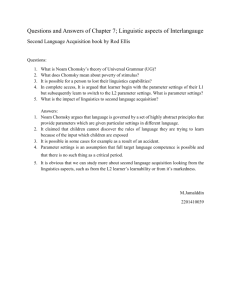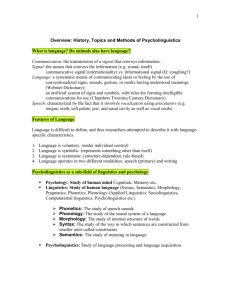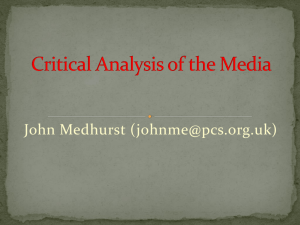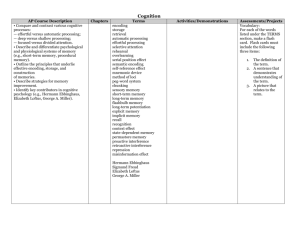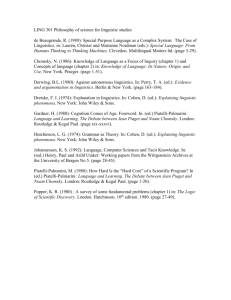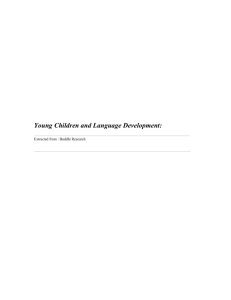File - TESOL Capstone ePortfolio
advertisement
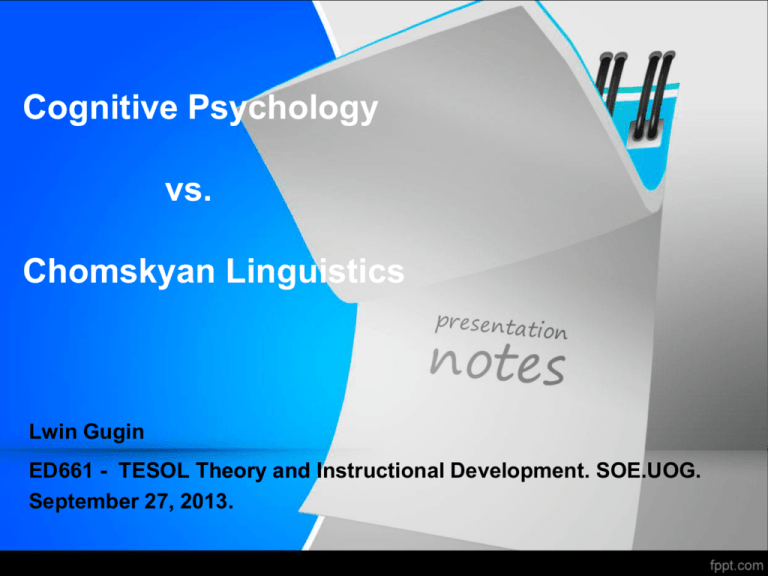
Cognitive Psychology vs. Chomskyan Linguistics Lwin Gugin ED661 - TESOL Theory and Instructional Development. SOE.UOG. September 27, 2013. What is Cognitive Psychology? • It is the scientific study of mind and mental function, including learning, memory, attention, perception, reasoning, language, conceptual development, and decision making. • The modern study of cognition rests on the premise that the brain can be understood as a complex computing system (Rutgers. School of Arts and Science) Cognitive Psychology (continued) • Fundamentally, cognitive psychology studies how people acquire and apply knowledge or information. • It is closely related to the highly interdisciplinary cognitive science and influenced by artificial intelligence, computer science, philosophy, anthropology, linguistics, biology, physics, and neuroscience. Lu, Z-L., & Dosher, B. A. (2007). Cognitive Psychology and Chomskyan Linguistics • 1950s - The Cognitive Revolution began • Researchers in several fields, including Noam Chomsky (1959) began to develop theories of mind based on complex representations and computational procedures • In the 1960s, Chomsky talked about the relationships between transformational grammar and experimental psychology, one of the three approaches of Cognitive Psychology. Learning and language processing, sub-domains of Cognitive Psychology • Cognitive psychologists study which new information is acquired and the conditions under which it is acquired. • Psycholinguistics focuses on language acquisition, language comprehension, language production, and the psychology of reading • Linguistic approaches focus on the formal structures of languages and language use (Chomsky, 1965). Lu, Z-L., & Dosher, B. A. ((2007). Language, Linguistics and Chomsky Chomsky (1928 – •Is a philosopher, linguist, and political scientist. •Received his Ph. D in 1955 from the University of Pennsylvania in Philadelphia, and joined the staff of the MIT in the same year. •“Chomsky is, without a doubt, the greatest linguist ever,” (Rondal,1994). •Chomsky has been described as the "father of modern linguistics" (Graff and van Urk, 2012). Motherese and Language Acquisition: Chomsky’s Perspectives • “Motherese” is the implication of the fact that children acquire language because of the highly simplified language system presented to them. • Children commonly pick up the language from their peers who are not particularly organizing the data for them • Chomsky has stated that “language grows in the mind in the way other biological systems grow. • Children are presented with a certain range of data and their minds develop a rich and complex system of knowledge. (Chomsky, 1994, Interview with Rondal) Chomsky’s Nativist Theory • Language Acquisition is innately determined • Chomsky in 1965 proposed that all people have an innate biological ability to acquire a language • He theorized that people possess a Language Acquisition Device • LAD enables children to understand and make utterances that they have not previously heard. • Chomsky suggests that, if the correct input is provided, the LAD predisposes all people to the second language acquisition in the same manner. L2 Theory and Instruction with underpinning of Chomsky’s LAD Based on the LAD, Steven Krashen developed his monitor theory with the following hypotheses: – The Input Hypothesis (1977) – Natural Order Hypothesis (1981) – The Affective Filter Hypothesis(1982) and – The Acquisition vs. Learning Hypothesis (1985). Escamilla & Grassi (2000). Summing Up Cognitive Psychology Psycholinguistics Nativist Theory of L2 Acquisition References • Escamilla, K., & Grassi, E. (2000). A Brief Description of Second Language Acquisition. The Professional Development Resource Series, “Second Language Acquisition.” BUENO Center, University of Colorado, Boulder. Retrieved from http://www.wce.wwu.edu/Resources/CIRCLE/Articles/SLA%20Escamilla%2 BGrassi.pdf • Graff, P., & van Urk, C. (Eds.). (2012). Chomsky’s Linguistics: Special edition collected works of Noam Chomsky. MIT Working Papers in Linguistics. ISBN-10: 0615567126, ISBN-13: 978-0615567129. Retrieved from http://mitwpl.mit.edu/catalog/chomsky. • Lu, Z-L., & Dosher, B. A. (2007). Cognitive Psychology. Scholarpedia, 2(8):2769. Retrieved from http://www.scholarpedia.org/article/Cognitive_psychology • Rondal, J. A. (1994). Pieces of Minds in Psycholinguistics: Steven Pinker, Kenneth Wexler, and Noam Chomsky. A Series of Interviews conducted by Jean A. Rondal. International Journal Of Psychology, 29(1), 85. • Rutgers. (2013). Program Overview. Cognitive Psychology. School of Arts and Science. Retrieved from http://psych.rutgers.edu/menu-iv/co.
